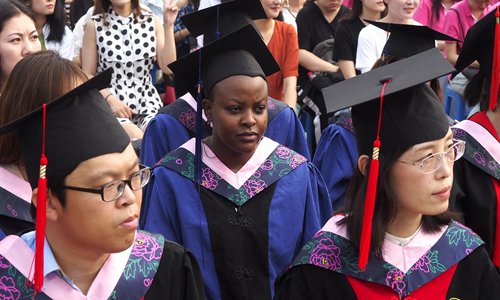HOME >> OPINION
Guests of China need to deserve what they get
By Shi Tian Source:Global Times Published: 2019/7/17 20:51:26

Photo: IC
Following several reports about expats falling foul of law, how China should treat foreigners has become a hot-button topic.
The Ji'nan-based Shandong University in East China reportedly assigned three "buddies" to every international student. Since many "buddies" are female while the majority of their foreign partners are male, some internet users could not help but comment that the varsity was "getting girlfriends for male foreign students."
On July 9, in Fuzhou, East China's Fujian Province, an international student was caught carrying a person on an electric scooter and resisted with violence when the traffic police accosted him. But no punitive measures were taken against the student.
And on July 10, personnel of Nanjing Metro in Jiangsu's capital were derided for selectively applying the law. Both Chinese and foreign passengers were found eating in the subway train compartment, which is against rules, but only the Chinese was reportedly issued a warning.
As Chinese people's sense of national identity and pride grows, these events taking place in different places at different times have been linked, forming a tornado of resentment. Foreigners in China have been granted "super-national treatment" and even extra-legal privileges, complain many Chinese.
Because of historical reasons and an evolving socioeconomic structure, the Chinese think pretty highly of foreign countries and take everything involving foreigners seriously. Only a small number of foreigners could be seen in this once underdeveloped country decades ago, hence, the hospitable Chinese nation was eager to show its courtesy to every guest. Offering foreigners certain special treatment has thus been regarded a matter of course in China for a long time.
Take some Chinese service providers' attitude toward foreigners. It was reported in December 2018 that a Chinese customer failed to request a refund from a Beijing-based bike sharing company; however, when the customer sent an email pretending to be a foreigner, the demand was almost immediately met.
Coming back to the international students, Shandong University's "buddy program" is not an isolated case. It is common for Chinese colleges to provide special dormitories and dining halls for foreign students, always considered much better than those offered to students from the country.
But times have changed. With more expats living in China, some people's obsequiousness for foreigners might lead to resentment and social unease.
The cases in Fuzhou and Nanjing are examples. Moreover, to cater to many Chinese parents' enthusiasm for native speakers in the English education market, some Chinese schools and institutions recruit foreign teachers without a background check, ignoring experience and educational qualifications. It is the passport that probably matters. This has created an undesirable milieu and given some foreigners an opportunity to exploit loopholes.
Some foreigners who receive preferential treatment in China could have been pulled up for undesirable acts in their own societies. Even outlaws are known to have found teaching English in China.
Neil Robinson, a Briton who had been jailed for 12 years for historical sex offences, had been working as a teacher in Beijing for several years, BBC reported in 2014. Daniel William Hiers, an American fugitive charged with sexual assault and murder, was also found teaching English in a Chinese college.
Such "privileges" can only hurt China's own people and the country's international image. However, indignation should not lead to hostility. The vast majority of foreign friends take the privileges as the Chinese way of saying "thank you" for their contributions to this country. We should be neither xenophobic nor xenocentric. As a rising power that is looking at opening up wider, fair and equal treatment of foreigners is a lesson we ought to learn.
The author is a freelance writer based in Beijing. opinion@globaltimes.com.cn
Posted in: VIEWPOINT